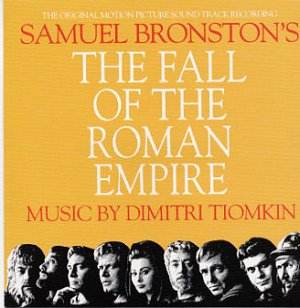Dimitri TIOMKIN The Fall
of the Roman
Empire  OST
OST  Sony-PEG Recordings 029
(38:53)
Sony-PEG Recordings 029
(38:53)
availability

The best way to see The Fall of the Roman Empire, the
acerbic critic John Simon once noted, was with a musician friend who owed
you money. "After 10 minutes of Dimitri Tiomkin's music," Simon said, "he'll
be limp; after three hours you can remove his wallet."
Well, perhaps. To say this is a vigorous score would be
understatement. Likewise, to say it's an epic work and a classic of the now
long-dead Hollywood spectacular genre also would be understatement. In his
liner notes to the original LP soundtrack in 1964, Tiomkin tells of being
asked if he was considering "a gimmick score" (very much in vogue at that
time) to represent 2nd century Rome. But no, the then 70-year-old composer
makes it clear from the opening notes of the main title -- a powerful solo
organ -- that he'll stick with a standard symphonic approach, thank you very
much. Building on that organ solo, Tiomkin introduces his primary theme --
later titled `The Fall of Love' -- in strings and later woodwinds, varying
its development only slightly as he exercises the full orchestra with powerful
flourishes of brass. This theme will recur throughout Fall of the Roman Empire,
occasionally in contrapuntal form as in the aptly titled cue `Tarantella,"
which accompanies the furious chariot duel between Stephen Boyd and Christopher
Plummer. But it is two set pieces -- `Pax Romana' and `Roman Forum' -- that
are the hallmarks of this score (and the music most likely to make that musician
friend go limp).
The first, `Pax Romana,' underscores a lengthy scene in which
a host of foreign leaders under Rome's authority are summoned to meet with
the Roman leader, played by the incomparable Alec Guinness. As each passes
by, he and Guinness exchange greetings. It would be interminable but for
Tiomkin's glorious music - written as an ongoing fanfare in a processional
mode, if you will. The cue lasts over five minutes. I'd be tempted to call
it a tour de force, but that term is better applied to `Roman Forum,' which
clocks in at just under five minutes and depicts the gamut of activity portrayed
on what was, at least to that point, the largest set ever built for a motion
picture.
Two other cues deserve particular mention. For `Ballomar's
Barbarian Attack,' Tiomkin utilizes an expanded range of bass drums supported
by smaller percussion, deftly outlining the attackers' crude weaponry and
tactics. In marked contrast to this, as well as to the more vigorous cues
already mentioned, is `Resurrection,' a sublimely lyrical, almost hymn-like
piece of music for the death of James Mason who, along with Guinness and
Plummer, nearly saves Fall of the Roman Empire from collapsing under its
own weight.
While Tiomkin's score is broad in scope, his approach is perhaps
a bit more conservative than, say, Newman's or Rozsa's in scoring historical
epics. He even eschews a chorus- perhaps wisely, given that audience tastes
were changing by the mid-60s, but surprising nevertheless, given how effectively
he utilized choral accompaniment in his only other sword-and-sandal epic,
Land of the Pharoahs..
It's also interesting to note that Tiomkin apparently used
a pickup orchestra in London to record this score. The liner notes refer
simply to "110 of England's finest musicians," even though he used the Sinfonia
of London to record The Guns of Navarone a mere three years earlier. That
Tiomkin was able to elicit such an incredible performance from musicians
presumably not accustomed to playing together regularly is tribute to his
conducting skills. And all the more reason why landmark scores such as this
need to be heard in their original versions. As Screen Archives' Ray Faiola
has noted, Tiomkin's music is awfully difficult to reproduce, due in part
to his conflicting rhythms and his conductor's "penchant for fierce
attack."
While it would be nice to have another 20 or 30 minutes of
Fall of the Roman Empire in an expanded release, we can at least celebrate
having these 39 minutes from the original LP available on CD.
Reviewer
John Huether

Availablilty
We have had several enquiries about the availability of this disc. John Huether
obtained his copy from Barnes and Noble who inform us their source
was simply a U.S. distributor (Alliance) with no role in the U.K. UK reades
might sddress their complaints/suggestions to Sony/ PEG:-
PEG Recordings, 244 Fifth Avenue, Suite 2168, New York, N.Y., 10001
Sony Music Special Products, 550 Madison Avenue, New York, N.Y. 10022-3211